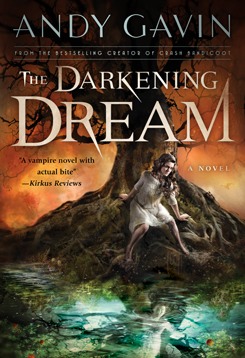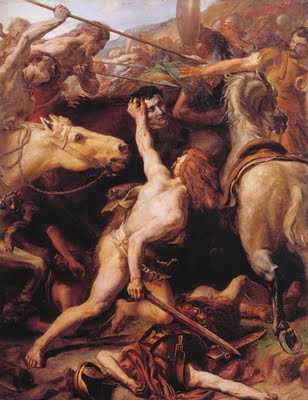As readers of The Darkening Dream are aware, nothing is ever black or white. Certainly this is the case with Pastor John Parris. Is he a villain or victim? Well… villain, but even the most evil come from somewhere. In this short story, which began life as a chapter in an older larger versions of the novel, we explore some important questions about the creepy little man:
- How did he come to dabble in witchcraft?
- Who was Grandmother Grace, and what was the manner of her unpleasant death?
- Is shit really useful for spellcraft? And most importantly…
- When did Parris meet his succubus lover, Betty?
It turns out, one weekend holds the answer to all four.
I’m publishing this in short story for free as part of the 2012 Fiction Frolic.

In 1875, when John Parris was two, his parents both succumbed to the influenza that swept through Boston. Soon after, he was sent to Salem and delivered into the care of his grandmother.
Grace Parris, for her part, was a very religious woman. She had long maintained that Satan infiltrated the weak hearted through even the smallest of lapses. Righteousness was to be earned, through the application of discipline, suffering, penitence, prayer, and any number of other important words. It was this way that she raised her grandson, and those words that she trusted he hold close when he matriculated at Harvard Divinity.
For Parris, Harvard meant new freedom, but liberty that came at the price of solitude. Years of practice with reserve had not gifted him with a temperament conducive to socializing or easy friendship.
Regardless, October 1893 in Cambridge was a testament to His glory and His works. The leaves took on every imaginable autumn hue, and the air was scented with the woodsy smell from a hundred fiery hearths. The second Saturday, after a particularly pleasant walk through Harvard Yard, he returned to his red-brick and white-trimmed colonial dormitory.
Inside, he found her waiting.
“Grandmother, what are you doing here?” he said.
“Nice to see you too, John.” She wore her traveling dress, severe and black like all her garments. She carried a single traveling case, and despite the pleasant weather, her large umbrella. “I took the train. It’s not proper for you to spend Sabbath without family. Tomorrow we shall go to church together.”
“Yes, Grandmother.” He made a study of his shoes on the way to his room.
“Close the door behind you, young man.”
Her demeanor stiffened the instant the clasp clicked. “Completely unacceptable. Look at your bed.” One corner of his sheets was indeed sloppy. “And this?” The point of her finger threatened a small book on his night table.
“Whitman’s Leaves of Grass, Grandmother.” He knew what was coming.
“This,” she tapped the volume of poems, “is Satan’s work. The only book by your bed should be His word.” She hurled the book into the fireplace. The flames were low, but the coals ignited nonetheless. “You must be cleansed of frivolity.”
Inside he was screaming, but years of habit forced him to face the wall and drop his pants to the floor.
Grandmother raised her umbrella. “Only through constant vigilance, and the reminder of His suffering on the cross can we transcend the corrupt influences of temptation.” She smacked the umbrella across his naked buttocks. The steel ribs tore into Parris’ skin.
After Grandmother left on Sunday evening, the pain in Parris’ nether regions burned dully. Four hours on a hard church pew had not improved matters, but left him with the usual combination of excitement and agitation.
He had put her on the train himself. This was his chance.
Manic energy helped thin arms pull his trunk from under the bed. Deep inside, underneath his winter clothes, was the false bottom. Such was his state, that the messy garments, even strewn about the room, didn’t bother him. He pried up the trunk bottom to reveal his special books and supplies. What he needed was there: two volumes, a small bowl, candles, and a flat piece of wood a foot square.
Parris built up the fire in the hearth, placed the candles in the bowl, and propped it by the heat to melt the wax. Grandmother’s visit had provided him with two crucial elements. First, a few hairs taken from her brush just this morning, and second, the repulsive contents of her chamber pot. Knowing her distaste for public bathrooms, he had offered to empty the ceramic convenience. Instead of dumping the contents into the lavatory latrine, he had poured the foul substance into a jar — soon stashed in a hall closet.
Now, he bound her long gray hairs around the wooden tablet. Then, carefully taking the molten wax from the fire, he added a urine-softened log of feces to the pale mixture. Stirring, he grimaced from the olfactory effect of the amalgamation. This brown and lumpy wax he carefully spooned across the face of the tablet, which was then placed it by the open window for the cool night air to dry.
An hour later, the room clean, Parris dressed in black linen shirt and trousers to sit cross-legged by the fire. He took up a stylus and began to carve a Latin inscription into the lumpy wax and feces covered surface of the tablet. He spoke the curse out loud:
Great Sterquilinus, thrice bind her. Bind her by the power of her own shit, bind her by the power of her own flesh, bind her by the power of my shared blood. Exact a terrible vengeance, oh Great Sterquilinus, bind her so that she shall shit no more! I implore you, and am in your debt.
Parris felt an odd tingling elation, like standing after kneeling for hours in prayer. The hall outside was quiet, and he tiptoed toward the lavatory while facing the wall, lest someone observe his strange and stinky burden. Thankfully, his destination was also empty. The lid covering the latrine brought forth the usual stench. He tossed the tablet into the blackness, calling after it three times, “Grace Parris, I curse thee.”
The electricity in his limbs redoubled, and he felt empowered by the completion of the ritual. His research had been most thorough, and he was convinced of the spell’s efficacy. Elated, he turned back toward his room to dispose of the evidence.
On the way, he passed two other students. The hallway was wide enough for three, but one of them veered at the last minute to collide with Parris. The other was far bigger, and Parris was thrown hard against the wooden wainscot.
“Excuse me.” The stranger tipped his hat.
Parris said nothing, only smiled at their receding backs. They would reap what they sowed. They all would.
In his room, the hearth flames had grown tall. As he shut his door, they danced, filling the fireplace out of proportion. He found himself drawn to the fire. The electric feeling mounted within him, and the flames pirouetted in lock step to the sensation. Like an illusionist’s curtain, the blazing surface parted.
He stepped into the darkness between.
Parris found himself lost in thick fog. The color and angle of the light betrayed the dawn hour, but the thick mist only illuminated, refusing to reveal. As he was thin, and a stranger to physical exertion, he labored under the heavy burden of his gear. The oval scutum shield weighed more than twenty pounds, and he had a difficult time balancing both it and the two long pilum spears. The cheek guards of his helmet chaffed his face. He wore sandals, and the lake waters to his left lapped against his feet. A rectangular iron plate was strapped to his chest and a heavy short sword to his wide leather belt. Grandmother’s bruises burned his buttocks as he marched in step with the legionaries to his sides.
Death rained from above, filling the clammy air with muffled screams. The adjacent soldier fell with an arrow piercing his neck. A fine mist of blood splattered Parris’s face. He twisted, stepping into the marshy wetness at the lake’s edge. Something small dropped from the sky to graze his right arm. A hail of lead pellets followed. He imitated the nearby legionaries by raising his scutum above his head. Further projectiles thudded against the shield’s leather marching-cover.
Horsemen swept through the ranks like riders of the apocalypse. A nearby beast reared, and its rider speared a legionary in the face. So powerful was the blow — driven with the momentum and weight of the animal — that the shaft drove into the man’s brain and lodged itself in the back of his helmet. This hapless soldier twitched like a speared fish. Parris peered from behind his shield at the enemy cavalryman struggling to free his weapon. What he saw loosed his bowels. The horse was small — almost a pony — and the man astride was a fierce looking Negro, naked except for a leopard-skin cloak. The terrible feline visage crowned the man’s dark face. The enemy horseman gave up on the first spear to draw another.
This he raised to impale Parris.
Two legionaries, shields interlocked, spears in hand, smashed into the cavalryman, driving the barbed iron tips into the horse’s neck.
A centurian, recognizable by his transverse crest, bellowed into the chaos. “Citizens! Lake Trasamine behind you, Hannibal’s Numidian beast fuckers in front. Three lines deep. Go Go! Form in front of the eagle, now!”
But the men only turned and ran, turned to be cut down from behind. Missiles pelted their unprotected backs. They dropped shields and weapons to flee into water stained red-brown with blood.
Parris too fled into the lake. He lost his gear, tore his heavy helmet from his head, and waded out with the others until they could barely stand, just their heads above the lake surface. He saw soldiers step deeper, struggle with heavy armor, and become bubbles agitating upwards from submerged faces. The milling Carthaginian infantry stood knee deep, but the Numidian cavalry amused itself by swimming their horses to swipe at bobbing Roman heads. Parris watched faces speared and brains splattered. He tugged his breastplate free and paddled feebly toward the center of the lake.
The sounds of death and dismemberment faded into the mist. Swim he might, but he had merely chosen a slower end by drowning. He pushed himself beyond any conceivable point of exhaustion. Soon, it was all he could do to stay afloat.
It was there, near the end, that she found him.
Betty’s skiff drifted out of the mist. She propelled the boat, a tiny coracle of roughly hewn timbers, with a long pole. Her pallid blue complexion seemed at home in the cold gray mists. She looked no younger or older than she would twenty years later, when her naked form and sagging breasts graced his bed.
“You seem in much need of warmth.” Her decayed fingers hauled him aboard the small craft, her strength surprising for one so slender.
Exhausted, Parris lay wet and panting on the tiny deck. Despite her strange and horrid appearance, desperation made her a welcome sight.
She poled the little craft further into the lake, and the screams were lost altogether in the mists, replaced by the gentle lapping of calmer waters. She examined him carefully, red fires burning in her black eye sockets.
“You don’t belong here,” she said. “Was it you who summoned me?”
“Not that I’m aware.” This outburst triggered a spasm of wet coughing.
Rank fumes closed in as she knelt, bare purple-skinned feet balancing on the tiny flat-bottomed craft. She tugged one of his arms to herself, and licked at his scrapes, her tongue like hot sandpaper.
“It was you,” she purred. “Which of ten thousand fucks spawned you, I know not. What do they call you?”
“John Parris, of Massachusetts,” he said.
Her smile revealed rotten and crooked teeth. “Truth knots mysteriously in this place. I was called Betty Anne Parris once. Long ago, I whelped a half-breed she-bitch by the incestuous seed of my own father, Samuel Parris. You smell like her spawn.” She giggled hysterically. “What brings you to this damned placed of abandoned hope and forgotten loss?” Her tone was soft and conversational, as if they had met on the carriage between Harvard and Central Squares.
“I don’t know. I think I came through fire. Somehow, I found myself a Roman soldier in some ancient war. Am I dead, lost in time?”
“They call this place the Campus Martius,” she said. “Truly, the ‘fields of Mars,’ a damned dominion where Hades and Ares rule together. Here, for countless eternities, great battles rage, men and beasts die, and the crows feast on their rotting flesh.”
“Is this hell?” he asked.
“Of sorts,” she answered. “There are as many foul and twisted places as there are suffering souls to imagine them.”
She reached one cold hand beneath his waterlogged tunic. What she found there she swiftly brought to life. Squatting, she lowered herself down onto him.
This first time only, she was tender.
He was surprised any energy remained in him, but a certain charge, not unlike what he had experienced back in his room, quickened him. For six years, he had pleasured himself in the guilt-ridden dark. To find even an instant of happiness here, so soon after escaping a terrible death, seemed so perverse, yet almost sacred.




